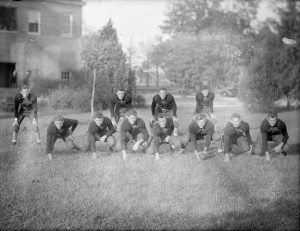Legal wagering and sports betting evolution has come a long way in a short period. However, wagering has always been intertwined with American culture. People in the United States have always found things to bet on before there were sports. Political betting was a significant trend in the United States initially, and it still is today.
We live in a society that enjoys betting, and this will never change. Here is the sports betting evolution in a nutshell.
REVOLUTIONARY HANDICAPPER SOFTWARE COMING INTO FOCUS
1920s: The Golden Era of Sports – Sports Betting Evolution
In the 1920s, sports betting started to be introduced because leagues were formalized. College football and basketball started to become reputable wagering options. It’s important to note that betting was outlawed at this time.
This golden era coincided with the Great Depression. People still bet during the depression because they thought it was a quick way to make money. Although, betting continued to bankrupt people during this time.
This was a reason there was a negative connotation around the practice.
ICYMI > A Look Back at the 2021 NHL Season
1931: Nevada Legalizes Gambling
Nevada was the first state to legalize gambling in 1931. Other states did not pay attention to this decision and kept betting illegal. New York crime families started to fill the void on the east coast.
The mob dealing with wagers pushed the nation to pass the Interstate Wire Act of 1961. This was the government’s way of removing illegal gambling. Nevada became the only location where the practice was legal.
More States Join Nevada
Delaware, Montana, and Oregon followed Nevada for legal sports wagering in the seventies and eighties. This made more states start to consider sports betting. The government did not want legal wagering instilled in United States culture.
Sports betting was gaining traction, which made Congress pass the Professional and Amateur Sports Protection Act. This was maybe the single biggest event that will mark the sports betting evolution.
PASPA in 1992
The Professional and Amateur Sports Protection Act (PASPA) was enacted in 1992. This banned nearly all sports betting in the United States. Nevada, Delaware, Montana, and Oregon were grandfathered into the bill.
Sports betting could only occur in four states once PASPA was passed. This made illegal gambling and offshore betting very popular. States were losing money because of PASPA, and there came to a point when the law was questioned.
PASPA is Questioned – What Does it Mean for Sports Betting Evolution
The New Jersey government believed that it was unconstitutional to ban sports betting in the country. The state fought the federal government for nearly a decade on the law.
The sports leagues got involved and lobbied against New Jersey. However, the legal battle ended up going in favor of the state. In 2018, the Supreme Court ruled that PASPA was unconstitutional by a 6-3 decision.
This decision gave states the right to legalize, adding to sports betting evolution. Many states had already passed sports wagering bills pending the repeal of PASPA. New Jersey was the first state to enact a bill following the ruling. What impact will this have on sports history?
PASPA was removed on May 14, 2018, through the case Murphy vs. NCAA. New Jersey legalized sports betting less than one month later, on June 11. Sports betting is now legal in 31 jurisdictions throughout the United States.
All wagering frameworks are different, but the industry has swept the nation.









